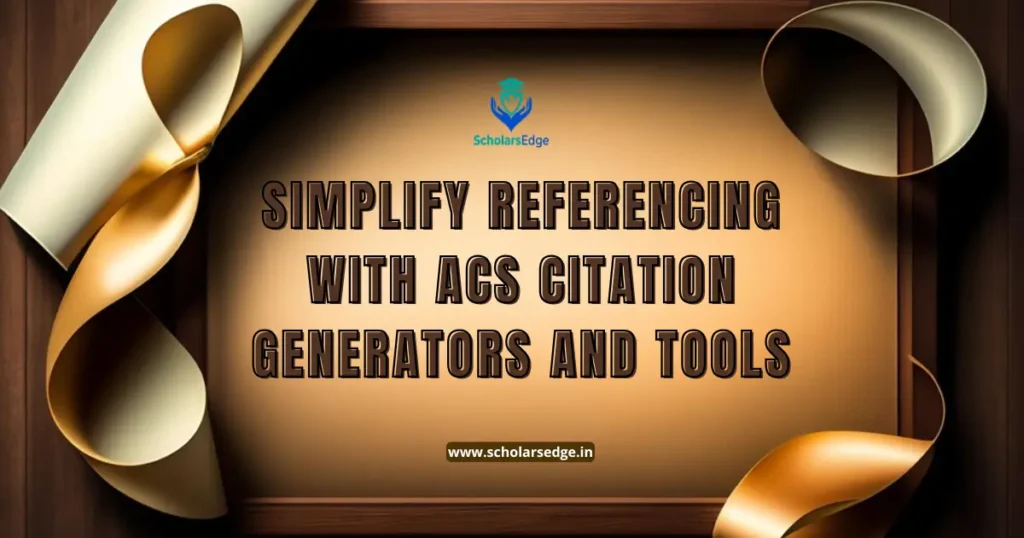
In academic writing, proper citation is not just a formality but an essential practice that upholds the integrity of scholarly communication. Among various citation styles, the American Chemical Society (ACS) citation style stands out, particularly in chemistry and related fields. This article explores how ACS citation generators and tools can simplify referencing, ensuring accuracy and efficiency for students, researchers, and professionals.
What is ACS Citation Style?
The ACS citation style is a standardized method developed by the American Chemical Society for documenting sources in scientific writing. Its key features include precision in language and clarity in referencing, which are vital for effective communication in scientific discourse. The style primarily employs three methods for citations:
- In-text citations: These can be formatted as superscript numbers or author-date references.
- Reference lists: A comprehensive list of all sources cited in the text, presented at the end of the document.
- Numbering system: This system assigns a unique number to each source, corresponding to its order of appearance in the text.
By adhering to these guidelines, authors can ensure their work is credible and easily verifiable.
What is an ACS Citation Generator?
An ACS citation generator is designed to automate the creation of citations in ACS format. These generators allow users to input relevant information about their sources—such as author names, titles, and publication dates—and then produce properly formatted citations. The importance of these tools cannot be overstated; they save time and reduce the likelihood of errors that can occur when manually formatting citations.
Moreover, AI-powered citation tools have emerged as innovative solutions that enhance the accuracy and efficiency of this process. These advanced tools can even suggest citations based on content analysis, making them invaluable for researchers who must manage extensive bibliographies.
How to Use ACS Citation Generators
Using an ACS citation generator is straightforward:
- Select a generator: Choose from popular online tools or software specifically for ACS citations.
- Input source information: Enter details such as author(s), title, publication year, and other relevant data.
- Generate citation: Click the generate button to receive your formatted citation.
For example, if you need to cite a journal article, you would input the article’s title, authors, journal name, volume number, issue number, and page range. The generator will then provide a citation like this:
- Journal Article
- Format: Author(s). Title of Article. *Journal Abbreviation* Year, *Volume*, Page Numbers.
- Example:
Smith, J. A.; Johnson, M. K. New Catalysts for Organic Synthesis. J. Org. Chem. 2020, 85, 1234–1240.
- Book
- Format: Author(s). *Title of Book*; Publisher: Place of Publication, Year; Page Numbers (if relevant).
- Example:
Brown, T. L.; Lemay, H. E.; Bursten, B. E. Chemistry: The Central Science; Pearson: Boston, 2017.
- Book Chapter
- Format: Author(s). Title of Chapter. In *Title of Book*; Editor(s); Publisher: Place of Publication, Year; Pages.
- Example:
Green, C. R. Structural Analysis of Polymers. In Polymer Chemistry; Jackson, R., Ed.; Academic Press: New York, 2019; pp 45–67.
- Website
- Format: Author (if available). Title of Page. URL (accessed Month Day, Year).
- Example:
American Chemical Society. ACS Style Guide. https://pubs.acs.org/ style guide (accessed Oct 29, 2024).
- Thesis/Dissertation
- Format: Author. Title of Thesis. Degree Type, Institution, Year.
- Example:
Patel, A. Synthesis of Nanomaterials. Ph.D. Thesis, University of California, Berkeley, 2021.
Creating ACS In-Text Citations
In-text citations in ACS style can be formatted in several ways:
- Superscript numbers: For example, “Research indicates significant findings.”¹
- Italic numbers in parentheses: For instance, “Research indicates significant findings (1).”
- Author-date format: “Smith (2020) notes that…”
Using citation generators simplifies this process by automatically formatting citations based on user preferences.
ACS Reference List and Bibliography
Formatting a reference list in ACS style requires attention to detail:
- References should be listed numerically if using superscript or parenthetical numbering.
- In contrast, references should be organized alphabetically by the first author’s last name if author-date citations are used.
For example:
Author1 Last Name, First Initial.; Author2 Last Name, First Initial. “Title.” Journal Name Year, Volume(Issue), Page Range.
In this format, the authors’ names are listed with initials first, followed by the article’s title, the journal in italics, and details of the publication such as year, volume, issue, and page range.
Citation generators can produce these lists with minimal input from users.
AI-Powered ACS Citation Tools
AI-based citation tools represent a significant advancement in how researchers manage their references. These tools can analyze text to identify potential sources and automatically generate citations based on context. For instance:
- Book summary citation finders can locate relevant books based on keywords from your research.
- Citation generators can suggest multiple formats for each source type.
The benefits of using AI tools include increased accuracy and reduced time spent on manual entry.
Best ACS Citation Generators and Tools
Several reliable ACS citation generators are available online:
| Tool Name | Features | Ease of Use | Accuracy | Customizability |
| EasyBib | Basic citations | High | Medium | Low |
| Zotero | Reference management | Medium | High | High |
| Mendeley | Collaboration features | Medium | High | Medium |
| BibMe | Quick citation generation | High | Medium | Low |
When choosing a tool, consider factors like ease of use, accuracy of generated citations, and whether you need additional features like collaboration or reference management.
Common Errors in ACS Citations and How to Avoid Them
Even with citation generators, errors can occur. Common mistakes include:
- Incorrect formatting of author names.
- Omitting necessary publication details.
- Misordering references.
To minimize these errors:
- Always double-check generated citations against official ACS guidelines.
- Familiarize yourself with common formatting rules specific to your source types.
Using citation generators significantly reduces these risks, but being vigilant remains essential.
Conclusion
Utilizing ACS citation generators streamlines the often-tedious process of referencing sources in academic writing. By automating citation creation and ensuring adherence to formatting standards, these tools enhance accuracy and efficiency for students and professionals alike. As research demands grow more complex, embracing such technologies will undoubtedly simplify the academic writing process while maintaining integrity through proper attribution. Therefore, consider integrating ACS citation tools into your workflow to optimize research efforts and uphold scholarly standards.
FAQs About ACS Citation Generators and Tools
What is the ACS style of referencing?
The ACS (American Chemical Society) referencing style is a citation format primarily used in chemistry. It includes three main citation systems: numerical, author-date, and the use of footnotes. The ACS style emphasizes properly attributing sources such as journals, books, and websites, ensuring that researchers credit the original authors. This style is widely recognized for its clarity and precision, making it suitable for academic and professional research papers in the sciences.
What are the main differences between ACS and other citation styles?
ACS style differs from other citation styles in its formatting rules, citation systems, and target audience. For instance, unlike APA’s author-date format, ACS offers three citation options, including a numbering system. MLA focuses on humanities and emphasizes the author-page format, while ACS is tailored to scientific research with an emphasis on chemistry. Additionally, ACS citations in reference lists are often condensed and specific to the scientific context, distinct from more generalized formats like Chicago or Harvard.
What is a citation generator tool?
A citation generator tool is an online or software-based resource that automatically formats citations in various styles, such as APA, MLA, ACS, etc. Users input details about a source—like the author’s name, title, and publication date—and the tool generates a properly formatted citation or bibliography entry. These tools save time, reduce errors, and ensure consistency in referencing, making them valuable for students, researchers, and writers who need to adhere to specific citation guidelines for their work.
